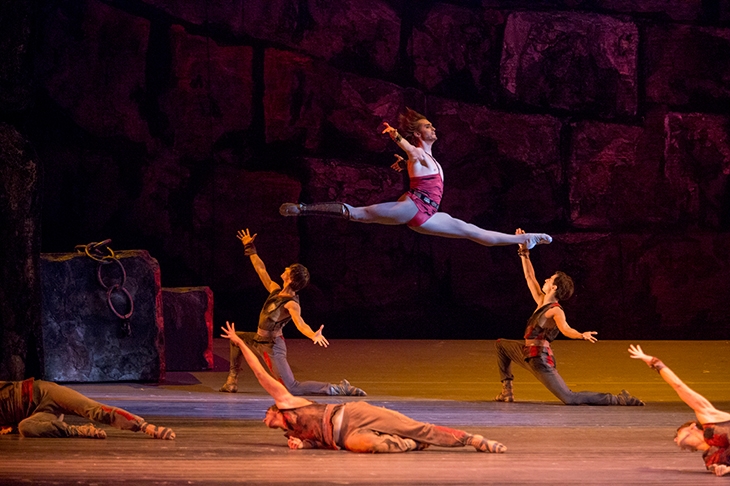It’s togas-a-go-go as the Bolshoi bring Yuri Grigorovich’s 1956 ballet Spartacus to the Royal Opera House. Oh dear, I did giggle. This is Spartacus in spandex with gladiatorial G-strings and slave girls dressed for Thracian strip shows. On comes Crassus (Artemy Belyakov) in the Roman empire’s tiniest tunic with a legion of soldiers swinging their shields like Gucci manbags. But what dancing: disciplined, muscular, nakedly heroic. Very Soviet.
Denis Rodkin is a mighty Spartacus, all vengeful savagery and outraged buttocks. There isn’t a dancer in the Royal Ballet to match his stamina, his power, his splits and leaps, his reckless stretching beyond possible endurance. True, there is more gurning than acting, but naturalism has never been a hallmark of Russian ballet.
Anastasia Denisova as Phrygia, sweetheart to Spartacus, was fragile and uncertain. Her lines are exquisite, her precision painstaking, but there was a gymslip gaucheness to her performance that made you nervous on her behalf. Svetlana Zakharova as Aegina, courtesan and lover to Crassus, not only steals the show, but holds it captive and demands a ransom. She shares with the Royal Ballet’s Marianela Nunez a palpable happiness in dancing. Two years ago, I interviewed Zakharova in Moscow and she told me, her translator reaching for the right word, that she loved to play ‘the hooligan’. Her Aegina is imperious and impish, feline and cruel. She is like a gorgeous cobra. Crassus, coming over all Sid James, can’t keep his hands off her. Zakharova is 40. See her while you can.
Golden fleeces for the Three Shepherds (Mikhail Kochan, Georgy Gusev and Alexei Putinstev) who do for shepherd’s crooks what Gene Kelly did for the umbrella in Singin’ in the Rain. Who needs a female partner when the props are this good? Silly, yes. Practically pantomime, sure. But this is a stellar Spartacus.
The best productions of Swan Lake run a feather up your spine. They give you a sinister, sensuous thrill. Despite a transfixing performance by Olga Smirnova as Odette/Odile, the Bolshoi’s Swan Lake managed only a tremor. As the white swan Odette, Smirnova effects an extraordinary transformation. She is fierce and fearful, guarded and beckoning. Her serene extensions and languid grace lend her Odette an otherworldly hauteur. As Siegfried, Semyon Chudin is a fine dancer but a mimsy Prince. Next to Smirnova’s swan, Chudin’s distrait Siegfried is a bit of a goose.
This is not a pretty production. The court scenes are set against a lurex backcloth of dreary, slurried greens. The lords and heralds dress for Dungeons & Dragons and wear weird Mick Jagger wigs. Some redemption comes in the second act with its ravishing tableau of Siegfried’s five auditioning brides. Hard to choose between them, but Anna Tikhomirova as the peppy Neapolitan and Victoria Yakusheva as the stately, saintly Russian are just pipped by Daria Bochkova’s swishy, seductive Spanish bride. For Siegfried only Odile will do. As the black swan Odile, Smirnova is transfixing. We know she is bewitched and under her icy control is a shiver of vulnerability. During her surpassingly brilliant throne-room fouettés I’d swear that smoke came out of her slippers. On my walk the next morning I watched the swans on the Serpentine. Not a patch on Smirnova.
The Bolshoi are here under the aegis of Victor Hochhauser, who died in March aged 95. For almost 70 years, Hochhauser and his wife Lilian, who was in the audience on opening night, have brought Russian orchestras, conductors, composers and dancers to Britain. At a time of renewed sanctions and ratcheting tensions, remember the man who held out a hand and invited Russia to dance.







Comments